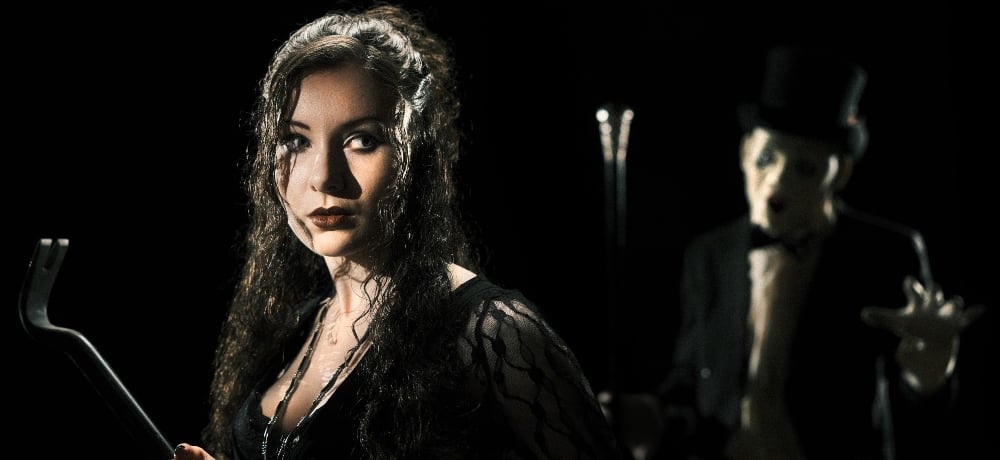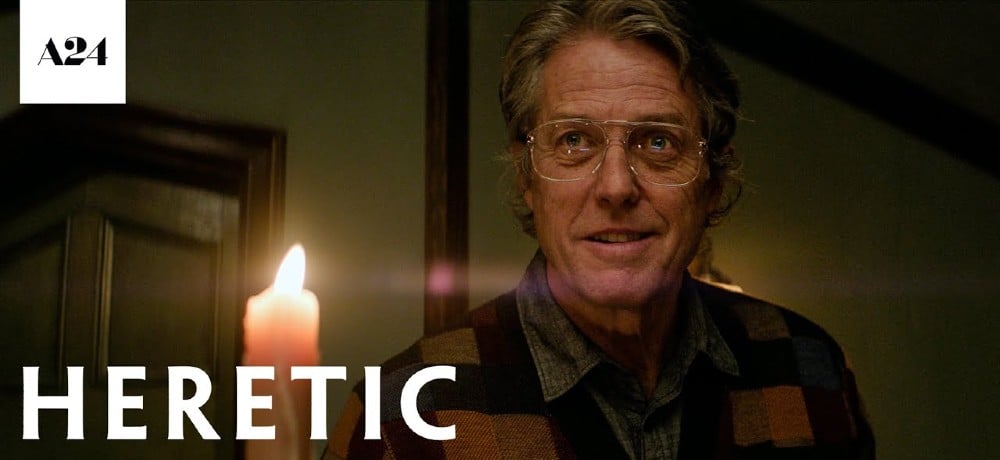






Oh, the horrors of being stuck debating religion for almost two hours. Scott Beck and Bryan Woods' Heretic traps viewers in a theological lockbox that fuels passionate debates. After writing A Quiet Place — a horror film with almost zero dialogue — Beck and Woods challenge themselves to write a horror movie that's almost explicitly conversational. Banter is provocative and stimulating initially, sprawling the thousands of religions throughout history ... until it's not. Chatter escalates from awkward inquisitions to life-or-death questions, but more challenging genre elements fail to excite as Beck and Woods wring the spoken word dry of tension.
Sister Barnes (Sophie Thatcher) and Sister Paxton (Chloe East) are Mormon mission callers out on assignment. They ring Mr. Reed's (Hugh Grant) doorbell, who invites them inside and out of the pouring rain. He offers them blueberry pie, asks prodding questions about Mormonism, and promises his wife will exchange pleasantries shortly. The sisters relax, recite talking points, and think nothing of Mr. Reed's hospitality — then the lights cut away. Suddenly, Mr. Reed doesn't appear to be as innocent as sworn.
Hugh Grant's performance is undoubtedly the film's greatest weapon. Whether he's dissecting religious texts or imitating Jar Jar Binks, the savvy orator is used to perfection. I'd listen to Grant read me all of Joseph Smith's golden plates, let alone speak-sing Radiohead's "Creep." Grant nails Mr. Reed's cocky intellectual aura as he prattles through arguments against every facet of organized religion, not restricted to Mormonism. Mr. Reed's mesmeric eloquence and infinite retorts make him appear all-knowing, but Grant also does well to oversell his kidnapper's self-destructive air of undefeatable control. Beneath the scripture quotes, Wikipedia factoids, and academic approach to murderous hypothesizing is a fraud who hides behind his ability to overtake conversations.
Sophie Thatcher and Chloe East are suitable innocents caught by a big bad wolf with an English accent. Introductory dialogue about magnum condoms reveals the girls’ personalities — Barnes is more worldly; Paxton is a Utah-bred prude. Barnes is the more protesting protector; Paxton is a meek field mouse you'd see on a Mormonism flyer. They become a sounding board for Mr. Reed’s theorizing and hole-poking, which both teens take more seriously when grim realities sink deep. Thatcher portrays an aware survivalist who figures out Mr. Reed's intentions quicker, while East folds like a lawn chair as an immediate response. Chemistry promotes teamwork, and as prisoners, they problem-solve with panicked faces. Thatcher and East are believably prototypical targets for scheming predators, and present Grant with malleable scene partners who bend to his villain's will.
The first half of Heretic flexes story-mapping muscles, especially when Beck and Woods' screenplay equates the three core religions (Judaism, Christianity, and Islam) to versions of Monopoly. Mr. Reed berates Barnes and Paxton with Elizabeth Magie's name, the creator of 1904's The Landlord's Game, which was stolen and sold as Monopoly. Through verbal gymnastics, we get to where "Iteration Theory" takes over. Mr. Reed concludes that religions are a continuous cycle of repeated stories that originated before Jesus' birth. It's all deliciously enrapturing as Grant holds our attention like a Reddit user in the first half of his twenty-page manifesto post. However, the film tries to veer into nastier horror territories only to remain distractingly talkative.
Beck and Woods continue the same train of thought as Mr. Reed forces Barnes and Paxton into his damp stone basement, a holding cell where he promises a divine miracle will occur. It's the milestone in other movies where approaches would transition into more physical dangers, but that's not Heretic. Beck and Woods continue pressing forward with Mr. Reed's insistence on answering questions with another question, which starts wearing his usage thin. There's always another diversion Mr. Reed can choose when Barnes or Paxton think they've outsmarted their captor, which undercuts imagery shifts to darkened dungeon aesthetics and gaunt veiled women. The film keeps talking at us and in circles instead of letting its horrors surge forward as words start losing their impact.
It's a frustrating third act because Beck and Woods chase stellar ideas throughout Heretic. Mr. Reed's diorama of his house trap recalls Dante's Divine Comedy, which becomes a recurring image as Barnes and Paxton descend downward. There's also an ease to theological conversations that avoids bias and addresses the pitfalls and salvation of belief models. Heretic handles controversial topics with sharp scripted methods for long enough, but Beck and Woods' third act needs variation. What's introduced plays the same roundabout games with a bit of added bloodshed, and even though Mr. Reed's exposed as a fool in the process, it's still an underwhelming outro that lacks revelation and intensified thrills.
Heretic peaks as a parlor thriller where opposing individuals tensely debate religious ideology without knowing if the "correct" answer will save someone's life. Beck and Woods flash excellent writing chops, and Hugh Grant exemplifies his (known) talents through dialogue alone. The problem becomes how long the film keeps this banter going and how wordiness overrides what should be a meaner third act. Like Mr. Reed, Heretic exposes itself as hollow the more it rambles about whatever's on the antagonist's mind. The first half is too good to be true — which is confirmed by the second chunk.
Movie Score: 2.5/5